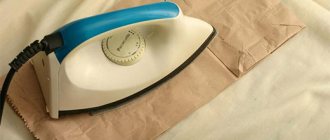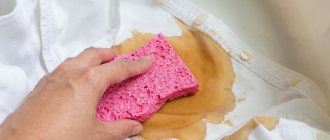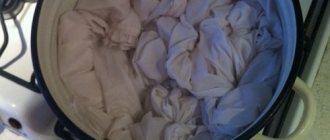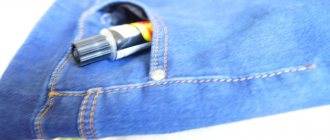Updated: 04/23/2021 12:22:04
Expert: Sofia Borisovna Fridman
If your favorite clothes, tablecloth or upholstery is stained with wax, there is no reason to worry. Getting rid of it without leaving a trace is not that difficult. Our experts learned how to effectively and quickly remove wax or paraffin stains using available products. We share the secrets of cleaning products made from different types of fabric, shoes and upholstery from the effects of dripping candles with the readers of our magazine.
On a note
- You can begin removing paraffin only after it has completely hardened. The substance is quickly absorbed and rubbing a fresh stain will cause it to increase. It is best to blot the still hot wax with a napkin.
- For the production of candles, a material with a dense and greasy texture is used. It does not dissolve with water, so regular washing will not remove the wax.
- The longer paraffin remains on the fabric, the deeper it penetrates the fibers and the larger the oil stain will be. Therefore, you need to act quickly.
- The effect of the solvent and stain remover must first be checked on the wrong side or on the waistband so as not to disturb the color or get streaks.
- Often, after removing the wax, a trace of oil is visible on the clothes. You can remove it with known anti-greasy stain products. If the item is dry, then sprinkle the print with talcum powder and leave for half an hour. The powder is shaken off and the contaminated area is washed. Dish gel, vodka or alcohol will successfully remove the stain. All that remains is to wash the item in the usual way.
- White clothes made from natural fibers can be soaked in “Whiteness” to remove candle marks. The area with the imprint on the colored fabric is soaked in vinegar for half an hour. In case of severe contamination, a small amount of citric acid is added to it.
- It is better to remove wax residues from fabric with a toothbrush, because its bristles are the smoothest and do not disturb the structure of the material.
Recommendations
- Study the fabric fiber composition and the manufacturer's care recommendations.
- Since paraffin is not washed off with water, the use of special solvents will be required. When working with flammable liquids, be especially careful: exclude sources of fire near the procedure, use gloves and a mask, and do not bring liquids close to your face.
- Before using the product, test the reaction of the fabric in an inconspicuous area. If it has not faded and its structure has not been damaged, the product can be used on the entire product.
Removing wax from natural fabrics
Wax can be easily removed from natural materials such as cotton, linen or calico. To do this, you will need an iron, a piece of cotton cloth and ordinary napkins. Spread the product with drops on the surface with the wrong side up. Place several napkins under the contaminated area, cover the top with napkins and then with a cloth. Run a hot iron over the stain, heated to the maximum permissible temperature for this type of fabric. Turn off the steam supply. The wax will melt and be absorbed into the underlying material. If marks are still noticeable, replace the paper with clean paper and repeat the steps.
When the wax is colored
The hot iron method is not suitable for colored candles. At high temperatures, the dye is absorbed into the fabric and is almost impossible to remove. To remove colored wax from clothes and tablecloths, it is better to use an industrial stain remover or one of the following methods.
- Leave the item in the cold and scrape off the hardened mass. Treat the trace with borax and then with a mixture of salt and citric acid to remove stains. Rinse off any remaining product with water and wash clothes.
- Treat a stain on a light-colored fabric with hydrogen peroxide or a mixture of soda and citric acid.
- Dense material can be washed with plenty of hot water.
- In such cases, ammonia helps well and does not damage the fabric.
Is it possible to wash it?
If the stain is placed outside the house, then you will not be able to remove the stain without special means, so blot it with a paper or rag, and carry out detailed cleaning later.
It is possible to remove a wax stain, but do not rush, because the process is delicate. Beeswax contains vegetable and animal fats, and paraffin is a petroleum product. Regardless of what candles are made of, they leave an oily residue on clothing. You can remove it from any type of fabric, but not every method is suitable. You will learn in this article how to effectively remove a stain from a church candle and how to remove paraffin from clothes or things.
Methods for cleaning synthetic materials
For synthetic fabric, the method with a heated iron is suitable, but you need to act with extreme caution, setting the heating regulator to the “synthetic” position.
Hot water will help remove candle stains on materials for which ironing is contraindicated. The soiled item should be immersed in water heated to 50-70⁰C for 2 minutes. After this, remove any remaining paraffin with a clean cloth. Avoid rubbing the stain so that it does not become difficult to remove. If the first attempt does not bring the desired result, the procedure should be repeated.
You can get rid of wax marks on synthetics and raincoat fabric using solvents. For example, purified gasoline, acetone or turpentine. Moisten a cotton swab or cloth with the substance and blot the stain. If heavily soiled, leave the swab on the cloth for half an hour. Finish by washing clothes in a warm, soapy solution.
In some cases, alcohol helps remove wax from polyester. Blot the stain several times with a cotton napkin soaked in it.
Basic methods
Note. If you want to remove traces of paraffin that have become embedded in trousers or another item of clothing, wait until the wax has completely hardened. Otherwise, the situation will not improve, but, on the contrary, will worsen. As a result, the problem spot will increase in size.
Using the hot method involves heating paraffin to its melting point and separating it from the fibers of the material. The ideal tool for this is an iron. When thermally treating a stain, it is important to heat the electrical appliance to eighty degrees. It is recommended to prematurely remove the steam function from the standard mode.
Step-by-step instructions for removing wax from a candle:
- Clean off traces of paraffin. To do this, take a kitchen spatula or nail scissors. Proceed with extreme caution so as not to deform the fibers.
- Prepare a napkin, cotton cloth, white A4 sheet.
- While the iron is heating up, place a napkin underneath and on top of the material. Cover the paraffin blot with a cloth and a sheet of paper. Start ironing the stain.
- After cleaning, be sure to hand wash the item. A stain remover will help get rid of greasy marks.
- It is strictly forbidden to iron synthetic fabrics at eighty degrees.
- Do not use an iron to remove stains from colored candles. The dye used for their production will only penetrate more deeply into the fibers of the fabric, and your favorite sweater will certainly deteriorate.
Steam to remove candle wax
To use this method, equip yourself with:
- a piece of fabric made from natural fibers (an old T-shirt will do);
- hairdryer or professional steamer.
- Cover the paraffin blot with a napkin and start heating it with steam;
- under the influence of hot air, the stain will melt and be absorbed into the material;
- If there is no proper result, you can repeat the procedure several times.
I work in the household appliance repair industry. Extensive experience in restoring washing machines and dishwashers.
Freezing
This method will be most effective for the following materials: denim, leather, wool, products with pile.
To do this use:
- freezer (hardened wax is quickly removed even from light dresses).
- ice from the freezer;
- ice or cold water;
- toothbrush.
The result will be as fast as possible if the item is placed in the chamber immediately after the paraffin enters. This should be done quickly so that the wax does not absorb into the fibers.
IMPORTANT! This is the only way to save costume fabric.
If the clothing is made of thin, delicate material, use ice cubes to remove wax marks. Just apply them to the desired area, and after a few minutes, scrub the stain with a toothbrush.
Delicate fabrics and wool
Fabrics that require careful handling, such as wool, chiffon, silk, satin or organza, remove drops of wax with a stain remover for this type of fabric. If you don’t have a stain remover on hand, you should use dishwashing detergent. On a woolen dress, apply a few drops of liquid to the stain and leave until completely dry. Rinse off the gel and wash the item.
On knitwear and delicate fabrics, you can try to carefully remove the hardened wax with a spatula, knife or manicure file.
Paraffin on a bolognese coat is also removed with dish gel. Use a sponge with a detergent to wipe the stain and rinse with water until the foam disappears. Blot moisture with a soft cloth or towel.
Hot water
There is another way to apply heat to a paraffin or wax stain. This is a hot water treatment.
- Heat water in a kettle or draw hot water from a tap.
- Use someone's help to stretch the stained cloth over the bathtub or sink. As a last resort, stretch the clothes over a bucket or pan.
- Run hot water over the stain until the wax is completely dissolved.
- After treatment, wipe the stained area with a clean napkin and put the item in the wash.
What to do with suede and fur
Hardened wax is easily removed from fur products. To do this, you need to place them in the freezer or apply an ice pack to the contamination. Carefully brush the hardened wax onto the fibers, moving towards the ends so as not to damage the fur.
The method of using an iron to remove wax is also suitable for suede fabric. Only suede coated with the material should be applied to the sole of the iron for a short time, but under no circumstances should the iron be applied to it, because fleecy fabric cannot be ironed. The impact of a hot household appliance on a suede surface causes dents and gloss to appear.
If the first attempts are unsuccessful, it is recommended to make the next mixture. Combine 35 ml of ammonia, 10 ml of wine alcohol and 50 ml of gasoline. Moisten a cotton swab and apply to the stain for 5 minutes. After the wax has softened, wipe the stain with a wet cloth. This composition is also used for coats and velvet fabrics.
A proven method for restoring the structure of suede pile is exposure to steam. In this way, you can also remove paraffin by holding the item over steam. The soft composition can be easily cleaned with a brush or dry sponge. It’s just not recommended to rub the stain so as not to smear the wax.
There is another way. It is necessary to stir 1/2 tsp on a fleecy carpet. ammonia in 1 liter of water. Apply the solution to the stain using a damp flannel cloth. Gently rub the candle mark several times.
You can also use medical alcohol on wax on a shag carpet. It is enough to leave a moistened swab or sponge on the stain for 20-30 minutes.
Removing the waxy coating
There are two home methods for removing wax stains. Which one to choose will be determined by the type of material from which the damaged item is made. When in doubt, read the label on the clothing. On the tag, the manufacturer must indicate the composition of the fabric and the features of its care.
- "Hot" removal. Applicable for natural materials: cotton, linen, calico.
- "Cold" removal. Designed for fabrics that cannot be exposed to high temperatures. For example, for wool. And also for leather products, denim and corduroy.
Ironing method: 5 steps
The hot method involves heating the wax to melt it and release it from the fabric. This is done using an iron. When heat treatment, it is important to remember that the electrical appliance must be heated to an average of 80°C, turning off the steam function. In order for the procedure to be successful and quickly, you need to complete the following five steps.
- Clean off the wax. Before ironing paraffin from clothing, try to remove as much paraffin as possible. To do this, use a wooden spatula, the back of a knife, scissors, a nail file or a school ruler. Proceed with care so as not to damage your clothing.
- Prepare your inventory. Get everything you need: an iron, a piece of plain cloth, napkins, paper towels or sheets of clean paper.
- Preheat the iron. Set the maximum temperature allowed for a particular type of fabric.
- Place napkins on the bottom and top. Place damaged clothing on napkins with the stain facing up. And also cover the stain on top with a paper napkin, on top of which lay a cotton cloth. Iron it. As the wax sticks to the paper, it needs to be changed.
- Wash it. Wash off the remaining wax stain after ironing as usual. You will most likely need a stain remover.
Synthetic items do not like hot ironing; they can be processed in the same way, but at a low temperature. If you are afraid of damaging synthetic clothes, replace the iron with a hairdryer and follow the same principle.
Freezing method
The cold method of wax removal is suitable for dense materials, such as fur, leather or denim. To remove the stain, you need to strongly cool the area where the wax has dripped.
To do this, put the clothes in the freezer compartment or apply an ice pack to the paraffin drops, and in winter just take the item out into the cold. After such an operation, the wax can be removed with any flat object.
What to do with wax on a leather jacket
The peculiarity of leather is that it does not absorb wax, so it is easier to remove.
The cold will also help remove paraffin from leather clothes. After freezing, the material must be bent directly at the site of contamination. The wax will crack and can be easily removed with your fingers. Wipe away the shiny mark with a napkin.
If a greasy stain still remains, it can be wiped off with ammonia or acetone.
Talc, starch, baby powder
How to clean the grease stain remaining after scraping:
- Sprinkle the contaminated area with baby powder, talcum powder or starch.
- Cover with white paper on top and place something heavy.
- Leave under pressure for 40 minutes.
- Clean the surface with a brush.
- Wash.
Candle marks on jeans
Cleaning practical and thick jeans from wax drops will not be difficult.
- Place the jeans in a bag and put them in the freezer for 2 hours. Scrape off the frozen paraffin from the fabric and wash with powder.
- Washing with soaking is also effective. The trousers are soaked in hot water at 50-60°C with powder and kept for half an hour. Then they wash the stain with laundry soap and put the item in the washing machine.
- Keep the trousers over steam for 30 minutes and wash with powder in hot water.
- Drops from denim are quickly removed after soaking in alcohol and sprinkling with table salt. The effect is achieved after 4-5 times.
Paraffin stains are durable. The wax on the fabric should be treated with a stain remover or dish gel so as not to be washed again. Old blots may not be removed in one go, then the treatment is repeated.
It is not recommended to use ammonia for denim because it ruins the color.
Removing old stains
It is not always possible to remove old wax marks when an item has been lying in a closet without leaving a trace, but it is worth a try. Citric acid removes the frozen part well. The crystals are distributed over the area of the stain and lightly moistened with warm water from a spray bottle. Leave for 15-20 minutes and remove with a sponge.
An unusual product is also used, such as a preparation for removing wax after depilation. The oily composition quickly dissolves the wax on the fabric, and the stain is easily washed off. Nail polish remover can also be used successfully, but it discolors the fabric.
On silk and woolen items, old wax is washed off with dishwashing detergent. It is poured onto the stain, covered with cling film and left for a day. Then wash it with laundry soap.
If wax ends up on clothes during depilation
Fresh wax marks after cosmetic procedures can be quickly removed using warm vegetable oil. Apply a small amount to the stain and leave for 5 minutes to soak. Next, wash off the stain with dishwashing gel.
If you don’t have oil on hand, use special oil wipes, which are included in the set with wax strips. Olive or cosmetic oil is suitable, which is applied to a cotton pad and treated areas of clothing with paraffin.
Professional products
Unfortunately, not all home remedies will cope with wax stains. In especially severe cases, professional remedies will be required. They are difficult to find on sale because they are intended for dry cleaning.
But even if you have access to them, you should not use them at home. They are quite aggressive, so you need to work in a specially equipped room. In addition, experience is needed. Therefore, it is better to entrust the thing to professionals. They will definitely find a way to clean their clothes.
Don't give up your favorite item because of a few stains. There are many available ways to get rid of wax marks on clothes. Having chosen the most suitable one, all that remains is to do everything as carefully and accurately as possible.











